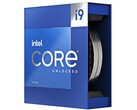It’s a not unfamiliar scenario: Intel processor manages to be the best performer in single-thread or single-core testing but lags behind an AMD part when it comes to multi-testing. However, Team Blue has closed that latter gap in recent years, especially thanks to the adoption of a hybrid microarchitecture. Team Red has focused heavily on upgrading the iGPU part of its processor offerings but also hasn’t forgotten how to tweak those multiple CPU cores, as has been revealed in a recent Intel Core i9-13900KF vs. AMD Ryzen 9 7950X PassMark-based showdown.
So, like many times before with the most-premium chips from Team Blue, the Intel Core i9-13900KF shows some serious single-thread performance by churning out 4,844 points on PassMark (based on two samples; high margin for error). The 24-core, 32-thread processor is recorded with a 125 W TDP up to 253 W with its 8x performance cores hitting up to 5.8 GHz. The result places the Raptor Lake chip +1.15% ahead of the i9-13900K, +9.92% ahead of the previous-generation i9-12900KS, and a whole +11.74% beyond the 4,335-mark produced by the AMD Ryzen 9 7950X. The i9-13900KF is the fastest chip here and apparently everyone else can go home.
Not exactly, because the Raptor Lake vs. Zen 4 benchmark leak contest has already demonstrated how much comparing recent Intel parts with AMD APUs is becoming more of an apples vs. oranges situation. The unlocked i9-13900KF is clearly a terrific processor, with its CPU test score of 64,273 points only a paltry -0.028% behind that of the Ryzen 9 7950X (64,291). Also, the suggested retail price of US$564 for the Intel part is much cheaper than the US$699 recommended for the Ryzen 7000 processor, and it uses the same LGA 1700 socket as Alder Lake while Zen 4 requires new AM5 motherboards. Yet, the Ryzen 9 7950X is still not especially a hard sell here.
For instance, the Raphael chip sports an RDNA 2-based graphics solution for a start while the Intel Core i9-13900KF requires a discrete graphics card. In addition to that built-in perk, the AMD Ryzen 9 7950X has a TDP of 170 W (lower than the TDP up of the Intel part despite having an iGPU that also requires power), and even though it has fewer cores than the i9-13900KF, they can clearly take better advantage of their respective architecture. The Intel processor scores 64,273 with 24 cores (8x performance, 16x efficient) while the AMD chip accrues 64,291 with 16 cores. The “best processor” notion is no longer a simple Intel vs. AMD run-off; it boils down to the most-important usage scenario for the individual consumer: master of one or jack of all trades.
Buy the Intel Core i9-12900KS or AMD Ryzen 9 5950X on Amazon
















